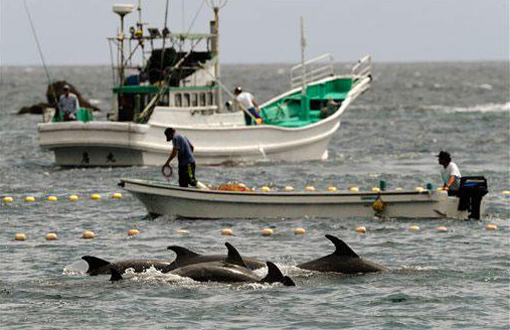Japan defends dolphin hunt after US criticism

 0 Comment(s)
0 Comment(s) Print
Print E-mail CNTV, January 22, 2014
E-mail CNTV, January 22, 2014
This year's dolphin hunt is on in a western Japanese town, which has come under international criticism. A Japanese government official has defended the annual hunt as a form of traditional fishing. He was responding after the US Ambassador to Japan tweeted that she was deeply concerned by the inhumanity of the practice. We warn that some viewers may find the images disturbing.
The annual dolphin hunt reddens the waters in the picturesque town of Taiji. More than 250 bottle nose dolphins were driven into a secluded bay, and selected for sale to marine parks or killed for meat. The 2009 release of an Oscar-winning documentary, "The Cove", made the hunt infamous. Japan has always claimed it's part of their tradition.
"The whale and dolphin have always been part of Taiji culture. I hope people in other countries could understand." said Hiroshi Nakajima, Taiji Museum Visitor.
The US Ambassador to Japan, Caroline Kennedy, tweeted on Saturday that she was "deeply concerned by inhumanness of drive hunt dolphin killing", and also said Washington opposes drive hunt fisheries. Japanese Cabinet Secretary Yoshihide Suga defended the practice.
"Dolphin fishing is one of traditional forms of our country and is carried out appropriately in accordance with the law. The dolphin is not covered by the International Whaling Commission control and it's controlled under the responsibility of each country. In any case, we will explain Japan's position to the American side." said Yoshihide Suga, Japanese Cabinet Secretary.
But animal protection groups say dolphin hunting in Taiji is mainly about money.
"Bpttle nose is very valuable. They can be trained to do tricks for human entertainment and sold for hundreds of thousands of dollars...It's very profitable for Taiji." said Melissa Sehgal, Sea Shepherd Conservation Society. Sea Shepherd is streaming live foottage of the Taiji cove, showing fishermen on several boats rounding up the dolphins inside the bay and stabbing them with long harpoons.
The whole bloody process lasts for nearly 30 minutes. It's a sight that the Japanese government tries to prevent journalists from covering. And the controversy isn't likely to go away.





